In prominent positions on several walls of our Courthouse Lobby is a pictorial display of great lawgivers throughout history. This is one way our community honors the collective contribution of these great lawgivers to the development of our country’s laws and legal system.
For students and others interested in learning how our laws were shaped upon important concepts of justice, fairness and faith in humanity and rights, this display can be a thought-provoking review of history. Our portrait display is modeled on the marble friezes of historical lawgivers in the United States Supreme Court in Washington D.C.; similar displays are found in many public buildings and courthouses across the country.
This display of great lawgivers – honored regardless of their differences in religion, geographic region, historical era, political philosophy, race or ethnicity – is breathtaking in demonstrating the ideals upon which our country’s legal system was founded. It is a visible reminder that the strength of our nation is its open and diverse society.
Our display also includes a framed reproduction of the United States Constitution. Below it is the message “To Know Peace, Obey These Laws,” which memorializes the intent of our country’s Founding Fathers.
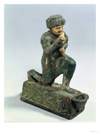 |
Hammurabi (born c.1700s B.C.)
King of Babylon and founder of the Babylonian Empire, Hammurabi is known for the Code of Hammurabi, the first surviving set of legal code covering both civil and criminal disputes. |
 |
Moses (born c. 1300s B.C.)
Prophet, lawgiver, and judge of the Israelites, Moses is credited with deliverance of Israelites from slavery and receipt of the Ten Commandments. Moses is holding two overlapping tablets, written in Hebrew, representing the Ten Commandments. Mosaic Law is based on the Torah, the first five books of the Old Testament. |
 |
Solomon (born c. 900s B.C.)
King of Israel and renowned judge, Solomon’s name is synonymous with “judicial wisdom.”
|
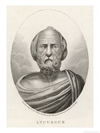 |
Lycurgus (born c. 800 B.C.)
A leading legislator and statesman of Sparta in ancient Greece, Lycurgus is credited with being the guiding force of the reform of the Spartan constitution. He left Sparta after convincing the Spartan leadership not to change his laws until he returned, but he never did.
|
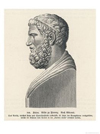 |
Solon (born 683 B.C.)
Solon, whose name has become to mean “a wise and skillful lawgiver,” was instrumental in remodeling the Athenian constitution and in codifying and reforming Athenian law, often revising the harsh or cruel laws of his predecessor, Draco. He is credited with laying the foundation for the world’s first democracy, although only a limited form of democracy for wealthier citizens. His name has come to mean “a wise and skillful lawgiver.”
|
 |
Confucius (551-479 B.C.)
A Chinese philosopher, his teachings laid a comprehensive system of ideas for government and society based on learning, self-discipline and virtues. At the center of his teachings was belief in balance and harmony. He said people in government should lead by example and emphasized a morality embodied in the idea that a person should not do to others what he would not want done to him. Among the aphorisms attributed to Confucius: “I could adjudicate lawsuits as well as anyone. But I would prefer to make lawsuits unnecessary.” Within 300 years of his death, the Chinese state adopted his teachings as the basis for government. Although officially abandoned by the Chinese government in 1912, Confucianism continues to have an influence throughout the world.
|
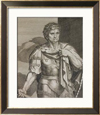 |
Octavian (63 B.C – 14 A.D.)
The first emperor of Rome, also called Caesar Augustus, he restored order and modernized many aspects of Roman life. He gave judges a new professional, authoritative role, and supported the concept of using previous opinions of leading jurists to aid in resolving new disputes. Adherence to precedent, one of the key principles of our modern law, fosters integrity in the law and public respect for the court as an institution.
|
 |
Jesus of Nazareth (born 1 A.D.)
The central figure of Christianity, his teachings formed the basis of much of the development of Western civilization, thought and culture. He encouraged unconditional, self-sacrificing love for God and all people, service, humility, forgiveness of sin, and the importance of following both the spirit and letter of the law. Thomas Jefferson considered Jesus’ teachings to be “the most sublime and benevolent code of morals which has ever been offered to man.” He is depicted holding a tablet with wording from two New Testament passages, which translate, “Judge not according to the appearance, but judge with righteous judgment,” and, “For with what judgment ye judge, ye shall be judged.”
|
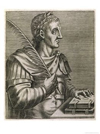 |
Justinian (C. 483-565)
The Byzantine emperor ordered the codification of Roman Law and published Corpus Juris Civilis (“Body of Civil Law”), a coherent code that became the basis for modern civil law. His work made the law more accessible and understandable and inspired the term “justice,” derived from his name.
|
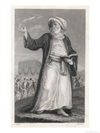 |
Muhammad (C. 570 – 632)
The Prophet of Islam is depicted holding Qur’an (Koran), the sacred scriptures from God, or Allah in Arabic. The Qur’an provides the primary source of Islamic Law, covering all private and public behavior. Muhammad’s teachings explain and implement Koranic principles, and formed the basis of much of the development of the law and culture of Middle Eastern countries. (The figure in the portrait is a well-intended attempt by an artist to honor Muhammad and it bears no resemblance to Muhammad. Muslims generally have a strong aversion to sculptured or pictured representations of their Prophet.)
|
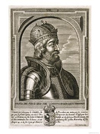 |
Charlemagne (C. 742 – 814)
The Roman Emperor and King of the Franks, he united and Christianized much of Western Europe in the Middle Ages, restoring order and education to what became the Holy Roman Empire. During his realm, he was also a reformer of judicial and military systems.
|
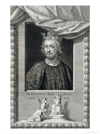 |
King John (1166 – 1216)
Born John Lackland, King John signed the Magna Carta, which ensured that neither he nor any future sovereign in England would be above the law. This document, only realized after a revolt, is regarded as the foundation of constitutional liberty in England and an inspiration for the later American colonists, as it elevated the importance of individual rights and the concept of due process (the idea that laws must be administered in the same way for all).
|
 |
Louis IX (1213-1270)
King of France, he led the seventh and eighth Crusades to the Holy Land. He instituted the first court of appeals known as the “Curia Regis,” recognizing it as a citizen’s right to appeal a verdict in all cases. He was canonized as Saint Louis.
|
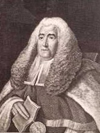 |
William Blackstone (1723 – 1780)
English law professor and jurist, he wrote the four-volume Commentaries on the Law of England, an extensive description of the state of the English law. His works had a major influence on England, the American colonies and other regions with common-law tradition. His Commentaries explained, in part, that the law of man must be subject to a higher, universal law. This was the basic premise of the Declaration of Independence: the King had violated inalienable rights granted to all men by their Creator.
|
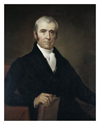 |
John Marshall (1755 – 1835)
Fourth Chief Justice of the United States, his opinion in Marbury v. Madison (1803) established the power of judicial review for the Supreme Court. Under his leadership, the nascent Supreme Court was able to advance to the position of a fully equal branch of the federal government as envisioned in the Constitution. In his 35 years of service on the Court, he was instrumental in developing a unified body of constitutional law and respect for the judiciary.
|
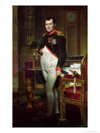 |
Napoleon Bonaparte (1769 – 1821)
Emperor of France, amid his many wars, ordered and directed the recodification of French law into what became known as the Code Napoleon or Civil Code. Published in 1804, this code formed the basis for modern civil law and had major influence on laws in Europe, Latin America, Francophone Africa, and even in the United States in the state of Louisiana. Napoleon is reported to have said: “My glory is not to have won forty battles; for Waterloo’s defeat will destroy the memory of as many victories. But what nothing will destroy, what will live forever, is my Civil Code.” Among its foundational principles were personal freedom, the ability to make contracts and equality among citizens. Louisiana is a civil law jurisdiction, and our unique Civil Code traces to the Napoleonic Code.
|
|

